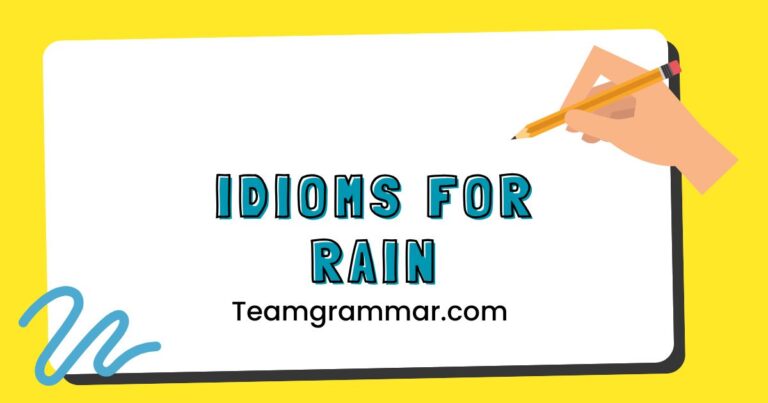37+ Idioms for Trust: Mastering English Expressions
Understanding idioms is crucial for mastering English, especially when discussing abstract concepts like trust. Idioms add color and nuance to communication, allowing for more expressive and relatable interactions.
This article delves into a wide range of idioms related to trust, providing definitions, examples, and practical exercises. Whether you’re an ESL learner or a native speaker, this guide will enhance your understanding and usage of these common expressions, making your conversations more engaging and effective.
This article is designed for English language learners, teachers, and anyone interested in improving their communication skills through a deeper understanding of idiomatic expressions.
Table of Contents
- Introduction
- Definition of Idioms for Trust
- Structural Breakdown of Idioms
- Types and Categories of Trust Idioms
- Examples of Idioms for Trust
- Usage Rules for Trust Idioms
- Common Mistakes When Using Trust Idioms
- Practice Exercises
- Advanced Topics: Nuances and Context
- Frequently Asked Questions
- Conclusion
Definition of Idioms for Trust
An idiom is a phrase or expression whose meaning cannot be understood from the literal meanings of its individual words. Instead, it has a figurative meaning that is culturally specific.
Idioms related to trust are expressions that convey the presence, absence, or violation of trust in various contexts. These idioms often rely on metaphors and analogies to illustrate the complex nature of trust, making them vivid and memorable.
In the realm of grammar, idioms function as fixed expressions. They are not subject to the same grammatical rules as regular phrases.
For example, you can’t usually change the word order or substitute words within an idiom without altering or destroying its meaning. The function of trust idioms is primarily communicative, serving to express feelings, opinions, and judgments about trustworthiness in a concise and impactful way.
These idioms are essential for native-like fluency and understanding nuanced communication.
Idioms are used in various contexts, from everyday conversations to formal writing. They appear in literature, journalism, and even business communications.
Understanding the context in which an idiom is used is crucial to interpreting its intended meaning. The emotional tone and the relationship between the speakers can significantly influence how an idiom is understood.
For example, using an idiom about betrayal might be appropriate in a conversation about politics but inappropriate in a casual chat with a new acquaintance.
Structural Breakdown of Idioms
The structure of idioms is fixed and non-compositional, meaning that the overall meaning cannot be derived from the individual words. This fixed nature is what distinguishes idioms from regular phrases.
Idioms can take various grammatical forms, including:
- Verb phrases: “take someone at their word”
- Noun phrases: “a leap of faith”
- Prepositional phrases: “on good authority”
- Clauses: “the jury is still out”
The patterns within idioms often involve metaphorical language, where concrete images represent abstract concepts. For instance, the idiom “to stab someone in the back” uses the image of physical violence to represent the act of betrayal.
Understanding these underlying metaphors can help in remembering and interpreting idioms. The structural integrity of an idiom is paramount; altering it usually results in miscommunication or a nonsensical statement.
It’s crucial to learn and use idioms as whole units to maintain their intended impact.
The syntax within an idiom can sometimes appear grammatically unusual when analyzed literally. For example, the phrase “bend over backwards” might seem odd if taken literally, but its idiomatic meaning is well-understood.
This divergence from standard grammatical rules is a characteristic feature of idioms. The context in which an idiom is used provides essential clues to its meaning.
Pay attention to the surrounding sentences and the overall conversation to grasp the intended message. Learning idioms involves memorization and practice, as their meanings are not always intuitively obvious.
Types and Categories of Trust Idioms
Idioms about trust can be categorized based on the specific aspect of trust they emphasize. Here are some common categories:
Idioms Emphasizing Reliability
These idioms describe the quality of being dependable and consistent in performing as expected. They often highlight the predictability and trustworthiness of a person or system.
Idioms Emphasizing Honesty
These idioms focus on truthfulness and integrity. They describe situations where someone is being truthful or deceptive, and the importance of honesty in relationships.
Idioms Emphasizing Loyalty
These idioms highlight the quality of being faithful and committed to someone or something. They often describe unwavering support and dedication, even in difficult times.
Idioms Emphasizing Confidentiality
These idioms relate to keeping secrets and maintaining privacy. They emphasize the importance of discretion and the consequences of revealing sensitive information.
Idioms Expressing Betrayal
These idioms describe the act of violating someone’s trust or confidence. They often convey feelings of hurt, anger, and disappointment.
Examples of Idioms for Trust
Here are several examples of idioms related to trust, organized by category. Each example is accompanied by a definition and example sentence to illustrate its usage.
Reliability Idioms Examples
The following table provides examples of idioms that emphasize reliability. Each idiom is defined, and an example sentence is provided for context.
| Idiom | Definition | Example Sentence |
|---|---|---|
| Someone’s word is their bond | Their promise is as reliable as a legal agreement. | John said he would help, and his word is his bond, so I’m sure he’ll be there. |
| As good as their word | Reliable and keeps promises. | She said she’d send the documents, and she was as good as her word. |
| Come through for someone | To do what is needed or expected. | I really needed help with the project, and my colleague came through for me. |
| Depend on someone | To rely on someone for support or help. | You can always depend on Sarah to get the job done right. |
| Bank on something | Rely on something happening. | I’m banking on getting that promotion; I’ve worked really hard. |
| Stand by someone | To support or defend someone. | Even when things got tough, he stood by his friend. |
| A safe pair of hands | Someone who is reliable and competent. | We need someone to manage this project, and she’s a safe pair of hands. |
| Solid as a rock | Extremely reliable and dependable. | Their relationship is solid as a rock; they’ve been together for years. |
| Be there for someone | To be available to support someone. | I know I can always count on my family to be there for me. |
| A sure thing | Something that is certain to happen. | With his experience, getting the job is a sure thing. |
| Can’t go wrong with | A reliable choice or option. | You can’t go wrong with this restaurant; the food is always excellent. |
| Always deliver | Consistently meets expectations. | Our team always delivers on time and within budget. |
| On the ball | Alert, competent, and reliable. | She’s really on the ball, always anticipating potential problems. |
| Keep their end of the bargain | Fulfill their part of an agreement. | He kept his end of the bargain and delivered the goods as promised. |
| Never let you down | Always reliable and supportive. | You can count on him; he’ll never let you down. |
| Pull their weight | Contribute fairly and reliably. | Everyone in the team needs to pull their weight to meet the deadline. |
| Stand the test of time | Proven reliable over a long period. | Their friendship has stood the test of time. |
| To a T | Perfectly and reliably. | He followed the instructions to a T and the project was successful. |
| True to their word | Reliable and keeps promises. | She’s true to her word, always doing what she says she will. |
| Like clockwork | Happening with perfect regularity and reliability. | The trains run like clockwork in this country. |
| A rock | Someone who provides consistent support and reliability. | During the crisis, she was a rock for her family. |
| Steady Eddie | A person who is consistently reliable and predictable. | He’s our Steady Eddie, always calm and dependable in a crisis. |
Honesty Idioms Examples
The following table provides examples of idioms that emphasize honesty. Each idiom is defined, and an example sentence is provided for context.
| Idiom | Definition | Example Sentence |
|---|---|---|
| Above board | Honest and legitimate. | The deal was completely above board; there were no hidden clauses. |
| On the level | Honest and truthful. | I trust him; I believe he’s on the level. |
| Straight shooter | A person who is honest and direct. | She’s a straight shooter; you can always count on her to tell you the truth. |
| Call a spade a spade | To speak frankly and honestly. | Let’s call a spade a spade; this project is failing. |
| Lay your cards on the table | To be open and honest about your intentions. | I’m going to lay my cards on the table and tell you exactly what I want. |
| Tell it like it is | To speak honestly, even if it’s unpleasant. | He always tells it like it is, which is why people trust him. |
| Honest to goodness | Truly honest. | I’m telling you, honest to goodness, I didn’t know about it. |
| Come clean | To confess or admit something. | He decided to come clean about his mistakes. |
| With open hands | Honestly and sincerely. | We approached the negotiation with open hands, ready to make a fair deal. |
| Paint a true picture | To give an accurate and honest account. | The report needs to paint a true picture of the company’s financial situation. |
| No axe to grind | Having no hidden motives or dishonest intentions. | I have no axe to grind; I’m just trying to help. |
| Give it to you straight | To be direct and honest. | Let me give it to you straight: this plan won’t work. |
| Keep your nose clean | To stay out of trouble and remain honest. | He’s trying to keep his nose clean after the scandal. |
| On the up and up | Honest and legitimate. | This business is on the up and up; you can trust them. |
| Play fair | To act honestly and justly. | We expect everyone to play fair in this competition. |
| Shoot from the hip | To speak frankly and honestly, without hesitation. | He tends to shoot from the hip, which can sometimes offend people. |
| Speak your mind | To say what you honestly think. | Don’t be afraid to speak your mind during the meeting. |
| Take at face value | To accept something as it appears, without suspicion. | I took his explanation at face value. |
| The truth will out | The truth will eventually be revealed. | No matter how hard you try to hide it, the truth will out. |
| Through thick and thin | Remaining honest and loyal during difficult times. | They have supported each other through thick and thin. |
| In broad daylight | Openly and honestly, without hiding anything. | The transaction occurred in broad daylight, with full transparency. |
| Upfront | Honest and straightforward from the beginning. | He was upfront about the challenges we would face. |
| Without reservation | Honestly and completely. | I can recommend her without reservation. |
Loyalty Idioms Examples
The following table provides examples of idioms that emphasize loyalty. Each idiom is defined, and an example sentence is provided for context.
| Idiom | Definition | Example Sentence |
|---|---|---|
| Stand by someone | To support or defend someone, especially in difficult times. | She stood by her husband throughout the trial. |
| Through thick and thin | To remain loyal during good times and bad times. | They’ve been friends through thick and thin. |
| True blue | Completely loyal and faithful. | He’s a true blue supporter of the team. |
| Ride or die | Extremely loyal and willing to do anything for someone. | They are ride or die friends; they always have each other’s backs. |
| Have someone’s back | To support and protect someone. | I know I can always count on him to have my back. |
| Be in someone’s corner | To support and encourage someone. | I’m always in your corner, no matter what. |
| Stick by someone | To remain loyal to someone, even when others don’t. | She stuck by her friend when everyone else abandoned him. |
| Firmly in their camp | Loyal to a particular group or person. | He is firmly in their camp and supports all their decisions. |
| Attached at the hip | Very close and loyal to each other. | Those two are attached at the hip; they do everything together. |
| Defend to the death | To defend someone or something with utmost loyalty. | He would defend his family to the death. |
| Stand shoulder to shoulder | To stand united and loyal in support. | We will stand shoulder to shoulder with our allies. |
| Give unwavering support | To provide constant and loyal support. | She gave unwavering support to her team. |
| In league with | Working together in a loyal alliance. | They were in league with each other to achieve their goals. |
| A staunch supporter | A loyal and dedicated supporter. | He is a staunch supporter of the charity. |
| Hold the line | To remain loyal and steadfast. | We need to hold the line and not give in to pressure. |
| Loyal to the core | Completely and utterly loyal. | He is loyal to the core and would never betray his friends. |
| On your side | Being supportive and loyal. | I’m on your side and will help you in any way I can. |
| Pledge allegiance | To declare loyalty. | They pledged allegiance to the company. |
| See it through | To remain loyal and committed until the end. | We will see it through, no matter how difficult it gets. |
| Stand tall | To remain loyal and proud. | Even in the face of adversity, they stood tall. |
| Through good times and bad | Remaining loyal in all circumstances. | They’ve supported each other through good times and bad. |
| With you all the way | Expressing complete loyalty and support. | I’m with you all the way on this project. |
| Part and parcel | An integral and inseparable part, indicating unwavering loyalty. | Loyalty is part and parcel of our team’s values. |
Confidentiality Idioms Examples
The following table provides examples of idioms that emphasize confidentiality. Each idiom is defined, and an example sentence is provided for context.
| Idiom | Definition | Example Sentence |
|---|---|---|
| Keep something under wraps | To keep something secret. | We’re keeping the project under wraps until the official announcement. |
| Mum’s the word | Keep it a secret; don’t tell anyone. | Mum’s the word about the surprise party. |
| Spill the beans | To reveal a secret. | Don’t spill the beans about the surprise party! |
| Let the cat out of the bag | To reveal a secret accidentally. | He let the cat out of the bag when he mentioned the gift. |
| Loose lips sink ships | Careless talk can reveal important secrets. | Remember, loose lips sink ships; don’t discuss the details in public. |
| Keep something close to your chest | To keep something secret. | She’s keeping her plans close to her chest. |
| In strict confidence | To be kept completely secret. | This information is in strict confidence. |
| Behind closed doors | In private, away from public attention. | The negotiations took place behind closed doors. |
| Under the table | Secretly and often illegally. | They were conducting business under the table. |
| Keep a lid on something | To keep something secret or controlled. | We need to keep a lid on this information until we’re ready to announce it. |
| Sew your lips shut | To remain completely silent about something. | You need to sew your lips shut about this matter. |
| Take something to the grave | To keep something secret for your entire life. | He took that secret to the grave. |
| Between you and me | Confidentially, just between us. | Between you and me, I think he’s going to quit. |
| Under one’s hat | To keep something secret. | Keep this information under your hat. |
| Button your lip | To be quiet and not reveal a secret. | Button your lip about what you heard. |
| Classified information | Information that is officially secret. | This document contains classified information. |
| Seal your lips | To promise to keep something secret. | Seal your lips; this is top secret. |
| Off the record | Not to be officially recorded or revealed. | This is off the record; don’t quote me on it. |
| Hush-hush | Secret and confidential. | The project is very hush-hush. |
| Keep mum | To remain silent about something. | You need to keep mum about this. |
| In the vault | Securely kept secret. | The documents are kept in the vault. |
| Not for public consumption | Information that should not be shared with the general public. | This report is not for public consumption. |
| Privy to | Sharing in the knowledge of a secret. | Only a few people are privy to this information. |
Betrayal Idioms Examples
The following table provides examples of idioms that express betrayal. Each idiom is defined, and an example sentence is provided for context.
| Idiom | Definition | Example Sentence |
|---|---|---|
| Stab someone in the back | To betray someone’s trust. | He stabbed me in the back by taking credit for my work. |
| Two-faced | Deceptive and insincere. | I don’t trust her; she’s very two-faced. |
| Double-cross someone | To deceive or betray someone. | He double-crossed his partners and ran off with the money. |
| Sell someone out | To betray someone for personal gain. | He sold out his friends to save himself. |
| Break someone’s trust | To violate someone’s confidence. | He broke her trust when he lied to her. |
| Pull the rug out from under someone | To suddenly remove support or assistance. | They pulled the rug out from under him by canceling the project. |
| Leave in the lurch | To abandon someone in a difficult situation. | They left him in the lurch when he needed help the most. |
| A wolf in sheep’s clothing | Someone who appears harmless but is actually dangerous. | He seemed friendly, but he was a wolf in sheep’s clothing. |
| Betray a confidence | To reveal a secret that was entrusted to you. | He betrayed a confidence by telling everyone about her secret. |
| Turn against someone | To become an enemy of someone. | His own allies turned against him. |
| Go behind someone’s back | To do something secretly and without someone’s knowledge. | He went behind my back and made the deal without me. |
| Deceive someone | To mislead or trick someone. | He deceived her with false promises. |
| Play someone for a fool | To deceive someone into looking foolish. | He played me for a fool, and I fell for it. |
| Take advantage of someone | To exploit someone’s vulnerability. | He took advantage of her kindness. |
| Let someone down | To disappoint someone. | He let me down when he didn’t show up. |
| Cheat on someone | To be unfaithful in a relationship. | She found out he was cheating on her. |
| Lead someone on | To deceive someone by giving false hope. | He led her on, knowing he wasn’t interested in a relationship. |
| A Judas | A person who betrays a friend. | He’s a Judas; he betrayed everyone he knew. |
| Break faith with | To violate an agreement or promise. | The company broke faith with its employees. |
| Sell down the river | To betray someone for personal gain. | He sold his colleagues down the river to get ahead. |
| Burn bridges | To damage relationships beyond repair. | He burned bridges with his former employer. |
| Give the cold shoulder | To intentionally ignore someone. | She gave me the cold shoulder after the argument. |
| A slap in the face | An act of betrayal or insult. | His rejection was a slap in the face. |
Usage Rules for Trust Idioms
Using idioms correctly requires understanding their specific meanings and contexts. Here are some general rules to follow:
- Use idioms in appropriate contexts: Consider the situation and the relationship between the speakers. Some idioms are informal and should be avoided in formal settings.
- Avoid mixing idioms: Combining parts of different idioms can create nonsensical phrases.
- Pay attention to word order: Idioms have a fixed structure, and changing the word order can alter or destroy their meaning.
- Consider your audience: Ensure that your audience understands the idioms you are using. If in doubt, it’s best to avoid them.
- Practice regularly: The best way to master idioms is through consistent practice and exposure to the language.
It’s also important to be aware of regional variations in idiom usage. Some idioms may be more common in certain parts of the English-speaking world than others.
Listening to native speakers and reading widely can help you develop a better understanding of these variations. Understanding the cultural background of idioms can also enhance your comprehension and usage.
Many idioms have historical or cultural origins that add depth to their meaning.
Idioms should enhance your communication, not hinder it. If you’re unsure about the meaning or appropriateness of an idiom, it’s better to use a more straightforward expression.
Overusing idioms can also make your speech sound unnatural or forced. Strive for a balance between idiomatic and literal language to communicate effectively.
Remember that idioms are a tool to add color and nuance to your language, but they should be used judiciously and with consideration for your audience and context.
Common Mistakes When Using Trust Idioms
Many learners make common mistakes when using idioms. Here are some examples of incorrect usage and their corrected versions:
| Incorrect | Correct | Explanation |
|---|---|---|
| He stabbed me on the back. | He stabbed me in the back. | The correct preposition is “in.” |
| She spilled the beans out. | She spilled the beans. | “Out” is redundant in this idiom. |
| Keep it under hats. | Keep it under your hat. | The correct form is “your hat.” |
| Let the dog out of the bag. | Let the cat out of the bag. | The correct animal is “cat.” |
| He is a wolf in sheep’s clothes. | He is a wolf in sheep’s clothing. | The correct form is “clothing.” |
| They turned against to him. | They turned against him. | The preposition “to” is unnecessary. |
| She pulled the carpet out from under him. | She pulled the rug out from under him. | The correct word is “rug,” not “carpet.” |
| He sold me up the river. | He sold me down the river. | The correct preposition is “down.” |
| They left him on the lurch. | They left him in the lurch. | The correct preposition is “in.” |
| She has my back. | She has got my back. | The “got” is not necessary. Saying “She has my back” is sufficient to convey the meaning. |
Avoiding these common mistakes requires careful attention to detail and consistent practice. Pay close attention to the specific words and prepositions used in each idiom.
Reviewing examples and practicing with native speakers can also help you improve your accuracy. When in doubt, it’s always best to double-check the correct form of an idiom before using it.
Practice Exercises
Test your understanding of trust idioms with these practice exercises.
Exercise 1: Fill in the Blanks
Fill in the blanks with the appropriate idiom from the list below:
Idiom List: stabbed me in the back, on the level, through thick and thin, spill the beans, keep it under wraps, let the cat out of the bag, on the ball, word is their bond, sold me down the river, come clean
| Question | Answer |
|---|---|
| 1. I can always trust John because his __________ . | word is their bond |
| 2. She accidentally __________ about the surprise party. | let the cat out of the bag |
| 3. He __________ by taking credit for my ideas. | stabbed me in the back | 4. It’s important to __________ about what really happened. | come clean |
| 5. They have supported each other __________ . | through thick and thin |
| 6. The company __________ by outsourcing my job. | sold me down the river |
| 7. We need to __________ until the official announcement. | keep it under wraps |
| 8. You can trust him; he’s __________ . | on the level |
| 9. She’s really __________ , always anticipating potential problems. | on the ball |
| 10. Please don’t __________ about our plans; it’s a secret! | spill the beans |
Exercise 2: Matching Idioms to Meanings
Match the idiom with its correct meaning:
| Idiom | Meaning |
|---|---|
| 1. Two-faced | A. To remain silent about something. |
| 2. Keep mum | B. To betray someone’s trust. |
| 3. Break someone’s trust | C. Someone who is faithful and committed. |
| 4. True blue | D. Deceptive and insincere. |
| 5. Stand by someone | E. To support someone, especially in difficult times. |
Answers:
1. D
2. A
3. B
4. C
5. E
Exercise 3: Sentence Completion
Complete the following sentences using the appropriate trust idioms:
- If you need help, you can always __________ me. (depend on)
- He decided to __________ and admit his mistakes. (come clean)
- They have been friends __________ . (through thick and thin)
- She __________ when she revealed the secret. (spilled the beans)
- We must __________ this information. (keep a lid on)
Advanced Topics: Nuances and Context
Understanding the nuances of trust idioms involves recognizing how their meanings can shift based on context. The same idiom can convey different shades of meaning depending on the situation, the relationship between the speakers, and the emotional tone of the conversation.
For example, the idiom “stab someone in the back” can range from describing a minor act of betrayal to a severe breach of trust, depending on the specifics of the situation.
Cultural differences also play a significant role in the interpretation of idioms. What might be considered a harmless expression in one culture could be offensive or inappropriate in another.
It’s essential to be aware of these cultural nuances to avoid miscommunication and maintain positive relationships. Additionally, the historical origins of idioms can provide deeper insights into their meanings.
Understanding the stories or events that gave rise to an idiom can enhance your appreciation of its significance and usage.
Idioms are not static; they evolve over time. New idioms emerge, and the meanings of existing idioms can change.
Staying current with contemporary language trends can help you use idioms effectively and avoid sounding outdated. Pay attention to how idioms are used in modern media, literature, and conversations to keep your understanding up-to-date.
Mastering trust idioms is an ongoing process that requires continuous learning and adaptation.
Frequently Asked Questions
Conclusion
Mastering idioms for trust is a valuable skill for anyone looking to enhance their English communication. By understanding the definitions, structures, and usage rules of these expressions, you can add depth and nuance to your conversations and writing.
Remember to practice regularly, pay attention to context, and be mindful of cultural differences. With dedication and effort, you can confidently use trust idioms to express your thoughts and feelings with greater precision and impact.
Embrace the richness of the English language and continue to explore the fascinating world of idiomatic expressions.







